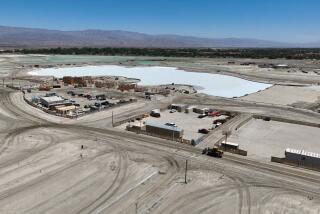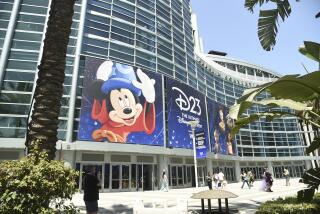War Jitters Mean Theme Parks Are In for Bumpy Ride : Tourism: Disneyland and Knott’s Berry Farm are hoping to lure local residents to make up for the low out-of-state attendance rates.
With the nation transfixed by the prospect of war in the Persian Gulf, fear is growing that a chunk of California’s $4.8-billion tourism business could become another casualty of the conflict.
The war jitters come as Southern California’s theme parks are beginning to feel the impact of recession. Attendance at Orange County amusement parks, Disneyland in Anaheim and Knott’s Berry Farm in Buena Park, is off as the slump takes hold.
And now they could face another jolt. The somber mood and specter of terrorism are likely to slow out-of-state tourism, at least until allied forces gain the upper hand, tourism officials predict.
“Everyone is going to sit home and watch TV,” said C. Lance Barnett, chief economist for the California Department of Commerce. Tourism, he added, will be “dead flat.”
Generally, tourism experts say people will likely defer trips to theme parks or other entertainment in the event of a two-week-long war, just as they have already put off purchases of new cars and appliances because of recession.
“A war will take a weak consumer-buying psychology and put a bullet in its brain,” predicted Emanuel Goldman, an analyst with the investment firm of Gerard Klauer Mattison & Co. in New York.
Compounding the problem is fear of terrorism. With Iraq suspected of harboring some of the world’s most notorious terrorists, potential tourists will stay home, said Mark Manson, an analyst for Donaldson Lufkin & Jenrette.
Theme park officials said their security staffs are taking steps to ensure that they do not become the target of terrorists. They also are more optimistic that battle will not be bad for business.
“Traditionally, theme parks have served as a diversion from bad times,” said Knott’s Berry Farm spokesman Stuart Zanville.
But others say that a war in the Persian Gulf could have some significant side effects for tourism. A prolonged conflict could be accompanied by sharp price hikes or shortages of gasoline, both of which would have a direct impact on tourism.
But even if gasoline lines reappear, park officials say the show must go on. The rides will be filled with more local residents, rather than out-of-state tourists.
Disneyland, which calls itself the Happiest Place on Earth, lured more local visitors during gasoline shortages of the 1970s to make up for a slippage in out-of-state tourism, spokesman Bob Roth said. People come for “a day’s escape from the worries of the world.”
All ready to deal with the economic slowdown, Disneyland recently announced a “resident salute” to allow Southern Californians to buy cut-rate tickets of $20 each through March 3. It is the first time the park has ever discounted prices for local residents.
Officials at Six Flags Magic Mountain in Valencia think that people will become weary of war news and seek a respite at amusement parks.
“The theme park is one of the only places people will go off their diets because it is fantasy, it is escapism,” Magic Mountain spokesman Courtney Simmons said. “Keeping with that mentality, it is fair to assume that should war break out, people in Southern California will turn to regional entertainment.”
In Orange County, officials said the worry of war has yet had no major impact on arts and entertainment.
Opera Pacific’s “Madama Butterfly” was a virtual sellout at the Orange County Performing Arts Center on Saturday night and Sunday afternoon, according to Pam Sezzin, Opera Pacific’s director of public relations.
Monday night at the Center, the Itzhak Perlman concert was more than a sellout, according to Eric Vollmer, of the sponsoring Orange County Philharmonic Society.
“You wouldn’t know there was a thing going on in the world, based on last night,” Vollmer said Tuesday. “The place was packed. Times staff writer Mark I. Pinsky contributed to this article.
More to Read
Inside the business of entertainment
The Wide Shot brings you news, analysis and insights on everything from streaming wars to production — and what it all means for the future.
You may occasionally receive promotional content from the Los Angeles Times.










